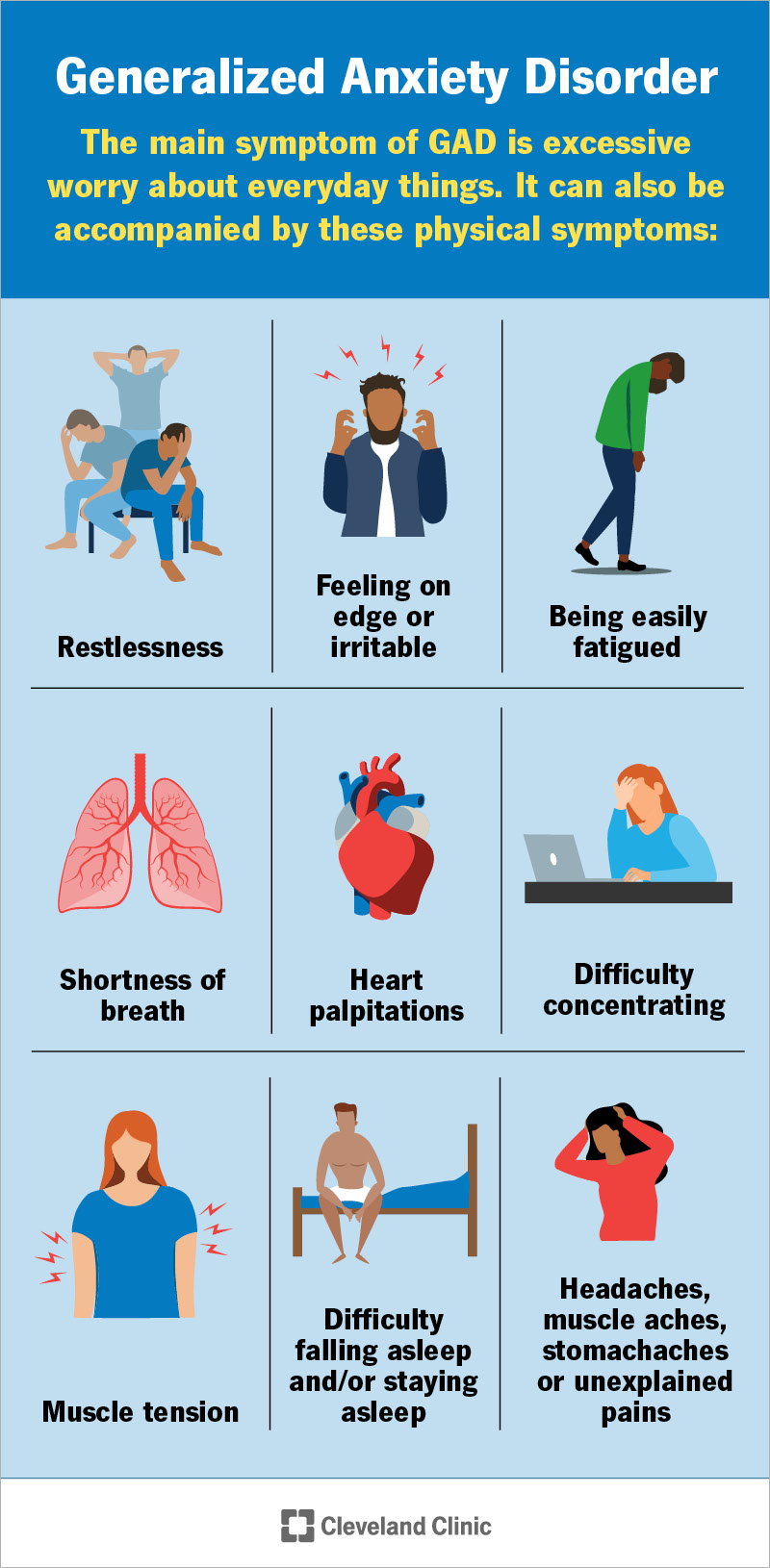Supportive and experienced therapy for anxiety designed for you
Supportive and experienced therapy for anxiety designed for you
Blog Article
Discovering Various Approaches in Therapy for Anxiousness Disorder for Long Lasting Modification
When dealing with anxiousness conditions, it's essential to explore a variety of counseling methods. Each approach offers unique insights and tools to aid you handle your signs and symptoms effectively. You may discover that integrating methods can produce the very best results. However, comprehending the nuances of these strategies is key to fostering enduring change. What if the right combination could launch a brand-new degree of psychological well-being for you?
Comprehending Anxiousness Conditions: A Brief Overview
Anxiousness disorders, which impact countless individuals worldwide, can significantly influence day-to-day live. You may experience frustrating feelings of worry or worry that seem uncontrollable. These feelings can cause physical signs like a racing heart, sweating, and even lightheadedness. Usual types of anxiety problems consist of generalized anxiousness disorder, panic attack, and social anxiousness problem. Each has unique indicators, however they all share a propensity to disrupt your routine and relationships.Understanding the source of your stress and anxiety is essential. It might originate from genetics, brain chemistry, or life experiences. Identifying your triggers can help you handle your reactions much better. It is very important to remember that you're not the only one in this struggle. Many individuals encounter similar obstacles, and seeking assistance is a solid action toward feeling better. By finding out about anxiousness problems, you're currently on the path to understanding and handling your problem a lot more properly.
Cognitive-Behavioral Therapy: Challenging Negative Thought Patterns

Determining Unfavorable Thought Triggers
Recognizing the details triggers behind your negative ideas can be crucial in managing anxiousness when you run into moments of distress. Start by taking notice of circumstances that provoke sensations of fear or worry. Is it a congested room, a future due date, or a conversation with specific individuals? Take down these instances in a journal. This will assist you identify patterns in your reasoning. Also, notification physical experiences that accompany your unfavorable thoughts, like a racing heart or tightness in your breast. By identifying these triggers, you get insight into what's sustaining your stress and anxiety. Understanding these links is the initial step in challenging those thoughts and ultimately restoring control over your psychological feedbacks.

Replacing Ideas With Positives
Testing unfavorable idea patterns is a vital step in transforming your frame of mind and minimizing anxiousness. You may typically find on your own entraped in cycles of insecurity or devastating thinking. Instead of letting these ideas dictate your sensations, practice replacing them with favorable affirmations or realistic options. When you believe, "I can't handle this," move it to, "I can handle obstacles one step at a time." This straightforward adjustment can considerably impact your psychological state. Regularly recognizing and countering these adverse thoughts assists create a much healthier internal dialogue. Remember, it takes some time and initiative, but regularly exercising this technique can lead to lasting modification, equipping you to deal with anxiousness with renewed self-confidence and durability
Building Coping Techniques Together
Replacing adverse thoughts is just the start of taking care of stress and anxiety effectively. To develop long-term change, you require to build coping methods that empower you. Cognitive-Behavioral Treatment (CBT) aids you identify and challenge those purposeless thought patterns. With each other, you and your counselor can explore exactly how these thoughts influence your sensations and behaviors.Start by establishing sensible techniques, like journaling or mindfulness workouts, that enable you to face anxiety head-on. When you encounter your fears gradually, you'll learn to react in different ways.

Mindfulness and Acceptance-Based Approaches: Growing Present-Moment Awareness
As you navigate the intricacies of anxiousness, including mindfulness and acceptance-based techniques can significantly enhance your capacity to cultivate present-moment understanding. By concentrating on the here and now, you'll find that you can observe your ideas and feelings without judgment. This method helps you acknowledge your anxiousness without feeling overwhelmed by it.Engaging in mindfulness exercises, such as deep breathing, body scans, or directed meditations, permits you to ground yourself in your present experience. Acceptance-based techniques encourage you to welcome your feelings instead of battle against them. When you approve your feelings, they lose their power over you.Incorporating these practices right into your daily routine can transform how you reply to stress and anxiety. You'll establish strength and find out to navigate difficult scenarios with higher ease. Eventually, cultivating present-moment awareness lays the structure for enduring modification, equipping you to lead an extra satisfying life.
Exposure Therapy: Facing Fears Progressively
Exposure treatment assists you confront your worries in a progressive means, making it less frustrating. You'll find out strategies to deal with anxiety-provoking situations detailed, while also constructing coping techniques to manage your reactions. This approach empowers you to take control and minimize anxiety with time.
Gradual Exposure Techniques
When encountering anxiety, slowly challenging your worries can be an effective method to gain back control. This strategy, called gradual exposure, entails gradually exposing on your own to the situations or objects that activate your anxiousness. Start with less challenging scenarios and slowly function your way as much as even more challenging ones. If you're scared of public talking, you might start by speaking in front of a mirror, then progress to sharing thoughts with a buddy, and ultimately resolve a tiny team. Each action helps desensitize you to the fear, developing your confidence over time. Bear in mind, it's important to rate yourself and commemorate tiny success as you move via this process, strengthening your capacity to manage anxiousness properly.
Building Coping Strategies
Building effective coping techniques is necessary for taking care of stress and anxiety, especially as you face your worries gradually. One powerful approach is direct exposure therapy, where you begin by facing your concerns in a controlled manner. Start with much less daunting scenarios and gradually function your method approximately even more tough situations. This gradual direct exposure helps desensitize you to anxiety causes, making them less overwhelming.Incorporate relaxation methods, such as deep breathing or mindfulness, to relax your mind throughout exposure. Track your progress, celebrating little success in the process to improve your confidence. Keep in mind, it's fine to take your time; the goal isn't perfection but steady enhancement. By constructing these techniques, you'll empower yourself to browse stress and anxiety and accept life a lot more completely.
Psychodynamic Treatment: Uncovering Source of Stress And Anxiety
Psychodynamic therapy checks out the unconscious mind, revealing the origin of your anxiety - Counseling services for anxiety. By analyzing your ideas, feelings, and past experiences, this approach helps you reveal underlying disputes and unresolved problems that might add to your existing anxiousness. You'll function with a specialist to investigate childhood years experiences, partnerships, and emotional patterns that shape your feedbacks today.As you get understanding right into these much deeper layers of your psyche, you'll begin to recognize exactly how past occasions influence your present actions. This understanding can lead to catharsis, permitting you to process emotions you might have suppressed.Through the healing connection, you can likewise identify defense mechanisms that may have developed over time, using a more clear course to transform. Ultimately, psychodynamic treatment furnishes you with the tools to address your anxiousness at its core, promoting enduring change in your psychological health
Holistic and integrative Approaches: Incorporating Strategies for Greater Efficacy
Integrating numerous therapeutic strategies can improve your journey towards handling anxiety much more efficiently. By integrating elements from cognitive-behavioral treatment, mindfulness practices, and holistic strategies, you can create a customized method that addresses your special demands. For example, you might make use of cognitive-behavioral methods to challenge unfavorable thought patterns while including mindfulness exercises to ground yourself in the here and now moment.Additionally, discovering all natural techniques such as yoga exercise or meditation can promote relaxation and minimize stress and anxiety symptoms. This mix enables you to create better self-awareness and resilience.Experimenting with these varied approaches can aid you uncover what resonates most with you. Keep in mind, it has to do with finding a synergy that functions, instead of adhering to a solitary method. This integrative method not only uses immediate relief yet also promotes lasting abilities for managing stress and anxiety, encouraging you to reclaim control over your life.
The Duty of Assistance Solutions: Structure Resilience Through Link
While it may appear that taking care of anxiousness is a singular trip, having a solid assistance system can play an important duty in your durability. Bordering on your own with empathetic friends, household, or support teams creates a secure room where you can freely share your experiences and sensations. You advise get more info on your own that you're not alone in this struggle.These connections provide support and can offer practical coping approaches that have worked for others when you connect with others. It's additionally an opportunity to gain point of view; good friends can assist you see circumstances differently, lowering feelings of isolation.Moreover, emotional support fosters a sense of belonging, which can substantially alleviate anxiousness symptoms. By leaning on your support group, you can develop resilience and take on challenges better. Remember, getting to out for help is an indication of stamina, and it can make all the distinction in your trip toward taking care of anxiety.
Frequently Asked Concerns
What Are the Typical Signs of Anxiety Conditions?
You might experience uneasyness, exhaustion, difficulty focusing, irritability, muscle mass tension, and sleep disruptions. Physical signs can consist of quick heartbeat, sweating, and trembling. Identifying these signs early can assist you seek proper support and treatment.

How Much Time Does Treatment Usually Last for Stress And Anxiety Disorders?
Therapy for anxiousness disorders commonly lasts anywhere from a couple of weeks to a number of months. It truly relies on your individual demands, progress, and the strategies your specialist makes use of to assist you manage your stress and anxiety effectively.
Can Medication Be Used Together With Therapy for Anxiety?
Yes, drug can certainly be utilized along with therapy for anxiousness. Incorporating both techniques commonly enhances therapy efficiency, assisting you handle symptoms while discovering underlying issues with counseling. Constantly consult your doctor for tailored suggestions.
Exist Self-Help Methods for Handling Anxiousness?
Yes, there are numerous self-help methods for managing anxiousness. You can practice mindfulness, take part in normal workout, keep a balanced diet regimen, establish a regular, and utilize deep breathing methods to help in reducing anxiousness signs effectively.
How Do I Know if I Need Expert Help for Anxiety?
You need to consider looking for professional help for stress and anxiety if it interferes with day-to-day life, triggers significant distress, or if self-help strategies aren't functioning. Trust your impulses; getting to out can lead to much better coping skills and assistance. Common kinds of anxiety problems consist of generalised anxiety condition, panic problem, and social anxiety disorder. When you come across moments of distress, identifying the details triggers behind your unfavorable thoughts can be important in managing anxiousness. Changing adverse thoughts is just the beginning of handling stress and anxiety effectively. By analyzing your ideas, sensations, and previous experiences, this technique helps you reveal underlying conflicts and unsettled concerns that might add to your present stress and anxiety. It's also an opportunity to gain point of view; close friends can help you see circumstances differently, reducing sensations of isolation (Counseling services for anxiety).Moreover, psychological assistance cultivates a sense of belonging, which can greatly reduce anxiety signs
Report this page